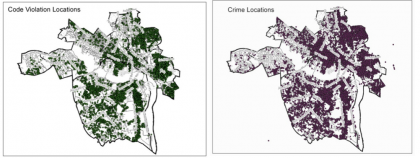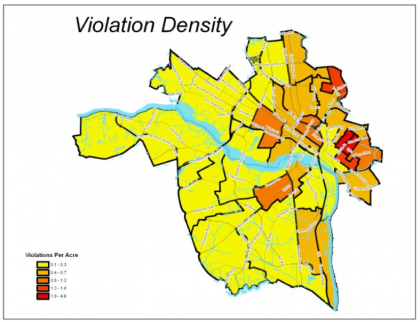RECENT COMMENTS
City Code Enforcement Audit “not surprising”
Richmond Slumlord Watch reports that the City Auditor’s Office just released a report on their audit of the City’s Property Maintenance Code Enforcement Division (PDF) and says that “the results are not surprising, nor are they entirely encouraging”:
In light of issues that have been highlighted on this blog in the past (vacant City-owned property, vacant houses that are not included on the vacant property registry), the report is refreshingly candid, both acknowledging shortcomings in the department and offering practical recommendations for improvement.
Selected pieces from the report (PDF):
The above maps depict that areas of high code violations have a higher number of crime incidences. Based on the above results and the broken window theory, there appears to be a correlation between code violations and crime. In addition to making the City aesthetically unacceptable, blight caused by unaddressed code violations may be a factor in encouraging criminal elements. However, the effect that code violations have on crime cannot be quantified.
TAGGED: Richmond Slumlord Watch








“However, the effect that code violations have on crime cannot be quantified.”
Actually, I think it *can* be quantified or at least somewhat so. Here’s Gladwell’s original article in The New Yorker, explaining the tipping point and broken windows theory. I remember reading it when it was originally published, and wishing that Richmond would apply some of the measures. Obviously, it’s about more than just code violations but code violations have a lot to do with the entire theory.
http://www.gladwell.com/1996/1996_06_03_a_tipping.htm
Wow! This is a scathing report exposing a completely broken department. Does anyone know if the leadership has been asked to resign? There’s no coming back from an audit that looks like this.
@crd: I highly recommend Gladwell’s book where he discusses that theory as well, The Tipping Point. I felt the same way, wishing we could see some of it implemented here, when I read it.
nbc12 ran a story on this last night (no video up yet): Audit faults city’s effort to fight blight (3/2/10)
Code enforcement should not be the scapegoat here. It is more than code enforcement that led to the culture of absentee landlords and swaths of vacant housing. That department is overwhelmed. The high volume of vacant property in the east end is due to Johnson’s Great Society more than some understaffed bureacratic office trying to pick up the pieces of decades of urban policies designed to prevent voter dilution.
John_M you looked and sounded Marvelous on the news clip. Rachel DePompa, the reporter, covering the story has been frequently seen beveraging at the “Market Starbucks”. She does a solid job covering District 7.
The soil is being tilled slowly; but it is being tilled.
Not surprised. Certainly the Department and City need to recognize the shortfalls. However, in their defense, I will say that they are overwhelmed by irresponsible, absentee landlords.
I again ask Council to consider landlord licenses.
The department is not overwhelmed. I got cited for having deflated rafts (trash)in my driveway.I asked if someone complained & he said he was cruising the area.(I live on a dead end culdesac)He ignored the 3 inoperable cars & a yard full of junk 50 yds. away.
@neighbor,
What factual information do you have to support the contention that Johnson’s Great Society programs caused high vacancy rates and excessive level of absentee ownership in the East End? And what do you mean by “decades of urban policies designed to prevent voter dilution”? You’re not making much sense.
Hey Fred,
I’ve just read an mind-blowing book about the years leading up to the “urban renewal” of Fulton, , The World of Patience Gromes. This narrative fills in some of that & I highly suggest checking it out. I got my copy at http://www.alibris.com/ for like 2$.
John,
I appreciate your taking the time to better understand the history behind many of our urban problems, especially with how urban renewal programs did great damage to our cities. Johnson’s Great Society programs, however, had little to do with the Urban Renewal programs of the 1950’s and early 60’s. In fact the Johnson administration oversaw significant changes to how HUD operated that shifted the purpose of HUD away from a clear and rebuild policy toward a community revitalization policy. To me it seems the “neighbor” had a clear partisan interest in pinning these issues (and many other related ones) to one particular President. The reasons for urban decay in the East End and many American cities are varied and the policies that have encouraged the process have been promulgated by many politicians from both parties. Attempting to so hastily place blame on one person is lazy reasoning.